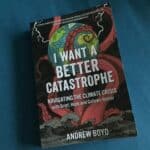I’ve been reading about climate change. I’ve been reading so much about climate change I’m starting to call myself The Grim Reader. And of course, no one wants to talk about it. Or they do, but they don’t know how. So I’m starting a new thing. A book club for one. The Grim Reader. Come along with me. Comment. Maybe it will not be a book club for one after all.
Like most people, I’d like to leave behind a world that is recognizable for those who come after me. I have an adult daughter. I’d like her to live in some degree of security and comfort after I’m gone. And if she has children, I’d like their world to be safe, secure, and somewhat recognizable. And if that’s what I want, it’s time to get serious. If we keep going the way we are going, those simple wishes will not come true. Not for me, not for any of us. We hit the 2 degree mark last week—twice. That is, we were 2 degrees over our pre-industrial average. It’s what “they” have been telling us for years absolutely can’t happen. And it happened.
Meanwhile COP28 is being held this week in a petro-authoritarian state and was being called a failure before it even started. *Sigh*. I expect there to be a lot of sighing in The Grim Reader. But there is hope.
There are a spate of books about hope and climate change. All the behavioural psych research says we have to have hope. Why act if there is no hope? I am personally of a more existential bent. I believe we can face hard truths (for example, each and every one of us is going to die) and still find meaning, joy, and purpose in our lives. This is why I want to start The Grim Reader with Andrew Boyd’s, I Want A Better Catastrophe.
 Boyd isn’t sugar coating anything. The premise of IWABC is that climate catastrophe is here. It’s baked in now. We’re in it. Welcome to the future. In his words, “We’re fucked.” But stay with me. He wonders, if we’re fucked (which we are), are we totally fucked or mostly fucked or a just little bit fucked. It matters. Because we want to find a better catastrophe.
Boyd isn’t sugar coating anything. The premise of IWABC is that climate catastrophe is here. It’s baked in now. We’re in it. Welcome to the future. In his words, “We’re fucked.” But stay with me. He wonders, if we’re fucked (which we are), are we totally fucked or mostly fucked or a just little bit fucked. It matters. Because we want to find a better catastrophe.
A better catastrophe is still possible, although the window is closing by the second. There is hope here. But it’s realistic hope. It’s the kind of hope that doesn’t exist purely as a result of denial. It’s the kind of hope I can get behind. It’s a “roll up your sleeves” kind of hope.
In describing his own journey as an activist, Boyd talks to so many others about theirs. There is dark humour, which is something I really need. Maybe that is what inspired me to call this new part of my website The Grim Reader.
IWABC is almost a compendium of everything everyone has ever said or thought about global warming/climate change/climate catastrophe. You can read it straight through or pick out pieces here and there.
There is even a little section on the right thing to call global warming/climate change/climate catastrophe. My own preference is climate catastrophe, but I think it turns people off. Too doomy. I’m currently throwing the term “climate insecurity” against the wall to see if it sticks. Because isn’t security what we all want? (Tangent Alert: If you think about security too, you might also want to listen to this year’s Massey Lectures by Astra Taylor.)
I also appreciate that after 352 pages, Boyd offers even more resources to turn to under the title “Stuff You Can (Still) Do.” It’s inspirational. You can reach the same information through his exceptional website, BetterCatastrophe.com.
If you do nothing else, check out his incredible flow chart. It’s a thing of beauty and a wonder of communication. It may change you. It changed me.
If you’ve read it, if you want to read it, if you have questions, please comment. I’d like not to be in The Grim Reader bookclub by myself.
(I review the occasional book on Goodreads, and IWABC is one of them. Some repetition, but also some other thoughts.)

I dreamed of a better apocalypse as well. I would have a cool outfit, run faster than everyone else, use survival skills in the midst of explosions, be able to recreate destroyed art and literature for the few brave humans that were left to carry on.
Instead, this is boring and irritating and just plain sad.
Will I read the book? Won’t it just make us sadder?
How will you know unless you read it?
I am reading it and I like it though it distracts me from looking at my phone all day…
But seriously…
Books on these heavy topics are usually so boringly written but the frequent use of ‘fuck’ and its’ derivatives keeps it alive.
And yes, I am grateful for reasons to carry on, strive for excellence and feel compassion for our fellow apocalypsers.
Tim DeChristopher says, in my favorite quote in the book:
“I have a lot of hope in my generation’s ability to build a better world in the ashes of this one.”
I share this hope and urge our older generations to support them more in their vision.